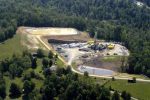UPDATE: The West Virginia Legislature enacted a forced pooling/unitization statute that took effect June 7, 2022. Rest assured that WVSORO made sure this law does NOT provide for the forced use of your surface for a drilling, pad, road or anything else. (And that is true even if you own the minerals and they force the minerals into a unit.) So the remainder of this web page is pretty much still in effect. Read about the forced pooling/unitization statute’s effect on mineral owners doing leasing (but not surface owners) on its own web page.
YES, a surface owner can clearly now stop a driller from placing a well site, road, water impoundment etc. on the surface owner’s land without getting you,the surface owner’s, consent and agreement. (We will be talking just about well sites below, but it all applies to roads and other things too.) There are only a few exceptions, see below.
This is the result of a unanimous decision of the West Virginia Supreme Court of Appeals. For the short version here is our press release. And here is a copy of the decision.
ProPublica and CBSN, the streaming web site of CBS news, have done an award winning documentary on the case.
Even if you do not want to stop the driller from using your surface — if you want to get some money out of allowing your land to be used this decision helps surface owners. This decision now gives you the leverage to get an agreement giving you many tens of thousands of dollars more for allowing them on, and giving you protections for the surface that exceed the State required protections.
We have a article you should use when negotiating for the use of your surface and well site. It’s called “The Provisions Needed by Surface Owners In Surface Use Agreements“. After, be sure to read the appendix to that article, “REDUCING NOISE IN GAS DRILLING AND PRODUCTION“. The subject of noise reduction is complicated and needed its own page.
Are there any exceptions? Are there still times when the driller can use my surface without my consent and agreement?
There are only a very few exceptions when a driller can use you surface for a horizontal well without your agreement and they are likely to apply only in rare cases.
First Exception: IF you or someone that owned the land before you owned both the surface AND minerals, AND IF you or that someone signed a lease for the minerals to be developed, AND IF that lease contained language allowing for use of the surface to drill HORIZONTAL wells, THEN you are stuck with the terms of the lease. Most newer leases do provide for that. But if it is an old lease, say before 2008 when horizontal drilling and the huge disruptive pads they use were not known, then you may still have a way to stop the driller. You need to talk to a lawyer about a “contemplation of the parties” defense. Or give us a call to get started.
Second Exception: If you, or if a previous surface owner who did not also own the minerals, signed papers to allow for a well pad for the drilling of a horizontal well, then you may not be able to stop the drilling. There is a chance you could still sue for damages and unjust enrichment. It depends on what the driller said to you to get you to sign the papers, and it depends on how courts interpret the recent Supreme Court case. See a lawyer. And tell the lawyer to call us.
Third Exception: If the mineral tract under your property is huge, if it is hundreds and hundreds of acres, then a driller may be able to drill a horizontal well bore that stays inside of the boundaries of the mineral tract under you. We find it rare that the underlying mineral tracts are that large in the area where Marcellus Shale and other horizontal wells are being drilled now. But it is possible. If that is true then the Supreme Court case above does not apply in your situation. However, in that case you may still have a legal theory to stop them because this kind of disturbance was not “in the contemplation of the parties” at the time the surface and minerals were separated. See a lawyer and have the lawyer call us. Or start with us. [NOTE: It is the size of the mineral tract under you that counts. It possible, even likely, that when the ownership of the surface and the ownership of the minerals were separated, the tract of property being “severed” was much larger than your surface tract is now. It is common for the surface to be subdivided after the minerals were separated. Unfortunately the mineral owner has a right to use any surface tract above the mineral tract. Again, see a lawyer. And feel free to call us first to understand this.]
Although it is unlikely that these three exceptions apply to you, in each exception we have offered some ways that you still may still be able to keep the well pad off of you or get leverage to negotiate a good payment and surface protections. In addition, here is a link to our old web page that we had before the Supreme Court decision. There may be help there also!
What is the driller likely to say to try to talk me into agreeing to the pad being on me even though I have the power to block it?
Forget your neighborly, friendly West Virginia get-along-with-everyone attitude. As the actor said in The Godfather. “Tell him it was just business.” The person who works for the driller is probably going to be a very nice person. Maybe even charming. But remember this is business, and with the money involved, and the disruption of these pads, it is big business. You should still be polite, but be firm and treat it like the big business that it is.
The driller may say you are keeping the mineral owner under you from getting their royalty money. The driller may talk about the jobs for your neighbors. Etc. Etc. Your response is that you are not saying they cannot drill into the mineral owners tract under you, you are not saying they cannot drill more wells somewhere, you are just saying they cannot use your surface to do it. One company’s average horizontal well bore length is two MILES. So they can find someone else around you that is willing to have a pad on them. And add that you do not think your neighbors, being good West Virginians, want you to be screwed over on their account — particularly if the well can be drilled somewhere else.
There may be other things that they will say. This web page is new and we will be adding to it as we hear what the drillers say. In fact, it would be nice if you would contact us and let us know what they are saying so we can give you and others arguments against what they are saying.
What if I never consented or agreed to the use of my land for a horizontal well pad and the driller has already done it anyway? What can I do about that.
The short version is that you can sue not only for the damages done to your land, but for annoyance and inconvenience and more. You can sue for hundreds of thousands of dollars. You may even be able to sue for more than that because of the unjust enrichment the driller received for trespassing on you. See a lawyer. Tell your lawyer to call us.
What if I am OK with the pad being on my surface as long as I get paid the right amount and have good protections for my surface? How much should I get? What surface protections should I agree to?
We have a article you should use when negotiating for the use of your surface and well site. It is long and thorough and should be read in its entirety before you sign any agreement. It’s called “The Provisions Needed by Surface Owners In Surface Use Agreements“. After, be sure to read the appendix to that article, “REDUCING NOISE IN GAS DRILLING AND PRODUCTION“. The subject of noise reduction is complicated and needed its own page.




